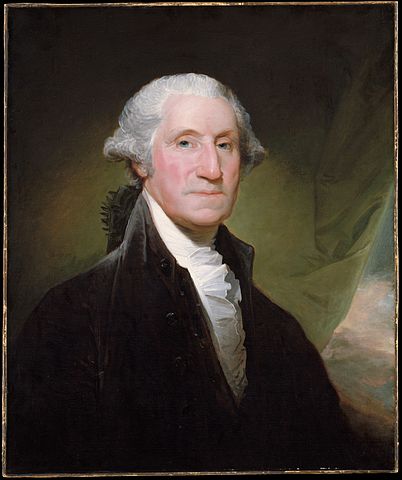In George “Washington’s Farewell Address to the People of the United States,” 1796, he warned us there would be days like this, times when someone like Donald Trump would get ahold of the playbook: "How to Become an Authoritarian Dictator for Dummies." “Washington’s Farewell Address to the People of the United States,” Sept. 19, 1796, U.S. Senate, https://www.senate.gov/artandhistory/history/resources/pdf/Washingtons_Farewell_Address.pdf
[Photo credit: wikimedia commons; Gilbert Stuart, 1795.]
Here are some relevant quotes.
“[A]void the necessity of those overgrown military establishments which, under any form of government, are inauspicious to liberty, and which are to be regarded as particularly hostile to republican liberty.” p. 8
“However combinations or associations [that is, political parties] . . . may now and then answer popular ends, they are likely . . . to become potent engines by which cunning, ambitious, and unprincipled men will be enabled to subvert the power of the people and to usurp for themselves the reins of government, destroying afterwards the very engines which have lifted them to unjust dominion.” p. 12
“I have already intimated to you the danger of parties in the state . . .. Let me now . . . warn you . . . against the baneful effects of the spirit of party, generally. This spirit . . . exists under different shapes in all governments, . . . but, in those of the popular form, it is seen in its greatest rankness and is truly their worst enemy. The alternate domination of one faction over another, sharpened by the spirit of revenge natural to party dissension [and] the most horrid enormities, is itself afrightful despotism. But this leads at length to a more formal and permanent despotism. The disorders and formal and permanent despotism. The disorders and miseries . . . gradually incline . . . men to seek security and repose in the absolute power of an individual; and sooner or later the chief of some prevailing faction, more able or more fortunate than his competitors, turns this disposition to the purposes of his own elevation on the ruins of public liberty.” pp. 13-14
“[L]et there be no change by usurpation; . . . it is the customary weapon by which free governments are destroyed.” p. 16
“Promote then, as an object of primary importance, institutions for the general diffusion of knowledge. In proportion as the structure of a government gives force to public opinion, it is essential that public opinion should be enlightened.” . . . “avoiding likewise the accumulation of debt, not only by shunning occasions of expense, but by vigorous exertions in time of peace to discharge the debts which unavoidable wars may have occasioned, not ungenerously throwing upon posterity the burden which we ourselves ought to bear.” p. 17
“that they [the words in this address] may now and then . . . guard against the impostures of pretended patriotism” p. 24
And while we're in the mood, a reminder of what all U.S. Senate and House members swear to abide when taking their oath of office. “I do solemnly swear (or affirm) that I will support and defend the Constitution of the United States against all enemies, foreign and domestic . . .."
“Oath of Office,” U.S. Senate, https://www.senate.gov/artandhistory/history/common/briefing/Oath_Office.htm

No comments:
Post a Comment